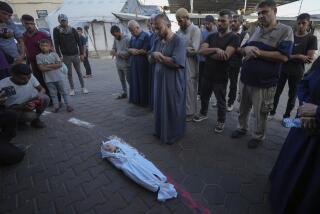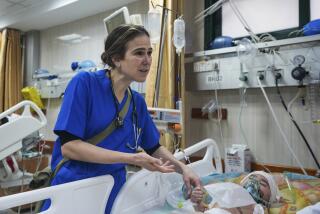Hospitals Can Cope With War, Military Says
- Share via
BERLIN — U.S. military officials downplayed reports Tuesday that they do not have enough space, qualified personnel or equipment to accommodate heavy combat casualties from the Persian Gulf.
Officials said they have classified contingency plans to deal with an influx of American wounded if fighting breaks out with Iraq.
Bill Swisher, a spokesman for the U.S. Army’s 7th Medical Command in Heidelberg, acknowledged that medical facilities in Germany were “stretched thinner” after about 2,000 medical personnel were deployed to the gulf. But he said an equal number of reservists arrived on Dec. 27 to replace them.
Officials now are “generally satisfied” they have enough staff to deal with the current level of noncombat casualties from the gulf and with routine peacetime medical services, he said.
Asked if the medical facilities could deal with a new influx of combat casualties, he said: “We can’t answer more specifically what might happen in the future. When the time comes, we feel we’ll be ready to do what the Army is asking us to do.”
Military spokesmen in Germany on Tuesday downplayed a report Monday in The Times that said U.S. military hospitals in Germany “are stretched thin just caring for the hundreds” of noncombat casualties among U.S. troops in the gulf.
The report quoted Col. Thomas Verdon, commander of the Landstuhl Army Medical Center, as saying that gulf-related injuries, along with the need to serve American dependents in Germany, were taxing medical services.
Swisher said that when Verdon spoke, the 2,000 doctors, nurses, medics and other personnel had been sent to the gulf and their replacements had not yet arrived.
“Our facilities were stretched thinner when the interview with Col. Verdon took place in mid-December,” Swisher said. “Since then, the arrival of about 2,000 Army Reserve and National Guard medical personnel has helped our facilities back toward normal.”
The Times article also questioned whether there were enough available beds and whether medical reservists had experience dealing with war wounded.
“We are working on having enough beds,” Swisher said.
More to Read
Sign up for Essential California
The most important California stories and recommendations in your inbox every morning.
You may occasionally receive promotional content from the Los Angeles Times.













